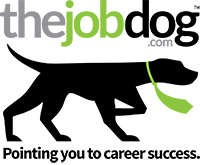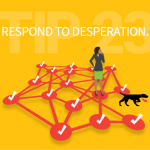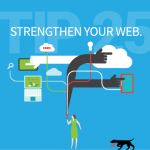Career Tip 24: Make Networking Cents – A Straightforward Primer
A Straightforward Primer
Are you lost in the maze of Internet job boards? Do you need help getting out? But, help from whom? To quote a Beatles song, “… gonna try with a little help from my friends.”
If a little help from your friends could get you out of the maze, then what friends should you ask? Admittedly, many friends, present or past, may not be of much value. However, one or two friends very well may have the information you need. The following story illustrates that point.

Years ago, The Job Dog had a paper route. I had a habit of putting pennies I received as payment in a large jar. I actually kept every penny, thinking that, from time to time, I would find one of value. Had I found a 1909-S VDB penny, I could have cashed it in for hundreds of dollars. (Never did come across one, though.) However, other pennies in my jar were worth far more than one cent. I found many of those. With those pennies and the money I earned delivering papers, I paid for my first two years of college – and my obedience school. Woof!

Years ago, The Job Dog had a paper route. I had a habit of putting pennies I received as payment in a large jar. I actually kept every penny, thinking that, from time to time, I would find one of value. Had I found a 1909-S VDB penny, I could have cashed it in for hundreds of dollars. (Never did come across one, though.) However, other pennies in my jar were worth far more than one cent. I found many of those. With those pennies and the money I earned delivering papers, I paid for my first two years of college – and my obedience school. Woof!
These pennies were a lot like “friends” to me. They provided a little help when I needed it. I never knew which pennies would turn out to be of added value. Whether pennies or friends, the principle is the same. When you use a system of collecting names of friends, you can sort through them and identify those names of greater value when you need a little help from a friend.
Which names should you collect? All of them. Don’t evaluate which names may have future value. Just collect names. When you retain a name in your database, it is then available for review when you need a referral or an insight. Someday, “a little help from my friends” will be the breakthrough connection to the job you need.
Consider these two real-life stories.
JOE
Joe had been applying for jobs online for months. One day, Joe told us he had recently applied online for THE perfect job. I asked if he knew anyone at the company whom he could ask for a referral. He did not. Knowing Joe needed a little help from a friend, I looked through my list of names (my database). I pondered each name, considering whom this person may know or how that person might help. I came across only one person whom I thought might offer value in this particular situation. I recalled that his wife worked at that company. I contacted my friend, and he asked me to send an email describing Joe, which he would forward to his wife. Note: I did not ask for preferential treatment. I only asked if his wife would find someone to look at Joe’s resume so it would not be lost in the avalanche of applicants. Joe got a phone call. After a couple of interviews, Joe got the job. Years of under-employment became history.
When I put that name in my database, I did not know if or when it would be valuable. As far as I was concerned, every name, someday, may have value. When I safeguarded each name in my database, I considered it simply “on standby.”
SUSAN
Susan had a good education from a major university. She had held a few jobs, but nothing that offered a career destiny. Through a family connection who knew about an unadvertised job, she found a part-time marketing position with a catering company in central Michigan.
Next, Susan’s goal was to upgrade to a career-oriented job in Chicago. To achieve this goal, she began working her networking list. With a little research, Susan found an old college friend living in Chicago. She sent her friend an email, asking her for job suggestions. The friend asked what Susan had been doing for work. It turned out that Susan’s part-time marketing job was valuable experience at her friend’s company. Susan’s friend made a referral, and a series of interviews followed. A month later, Susan had a job offer. She now lives in Chicago and loves her new job.
Most people would have limited their search to the Chicago job boards — and got nothing but frustration. Susan did more and got more. Will you?
When a name goes into your database, do not evaluate its worth. Only time will tell if it will have value.
When a name goes into your database, do not evaluate its worth. Only time will tell if it will have value.
Who should be on your networking list?
Past customers and suppliers.
Friends, relatives, and neighbors.
People involved in your social activities.
Old friends from former employers and school.
Former teachers and professors.
People mentioned in journals or newspapers connected to your profession.
People you meet at professional organization meetings, conferences, and trade shows.
Your banker, barber, hairstylist, pastor, dentist, insurance agent, doctor…. Each knows many people or may have heard of opportunities that could be a solid fit for you, and each may be able to make an introduction.
Checkpoint
Building a networking database begins with one easy step. Later, you can make your database as complex as you prefer. For now, get out a piece of flip-chart paper, and post it on a prominent wall in your home. Next, write down just three names. Tomorrow, write three more names. Repeat the process daily.
Don’t let “out of sight, out of mind” cost you a job. You never know when you will need a little help from a friend.
Don’t let “out of sight, out of mind” cost you a job. You never know when you will need a little help from a friend.
When should you get started?
Today.
Why not just recall names when you need them?
When you need a connection, referral, or insider information, it is far more likely you will find someone to help when you review a list of names you have accumulated over time.
Isn’t this what LinkedIn is about?
Yes, LinkedIn can be a resource.
However, not everyone you know is on LinkedIn. Also, as thoughts about a person arise, you cannot make notes about a person through LinkedIn.
What is a networking “database”?
It is any means you choose to keep names organized. Use 3×5 cards, a flip-chart page on the wall, or a Microsoft Word or Excel file. How you organize it is not as important as maintaining one file that stores all those names.
Won’t people be irritated or offended or feel intruded upon?
Some may, perhaps. Don’t let a few negative reactions limit your future. The vast majority of people want to help and will give you information they have, if you ask.
Don’t HR departments just want you to apply online?
A recent survey of Human Resources Managers confirmed that 60% of new hires come from some form of referral. One hundred percent of hiring managers we know believe referrals provide a more comprehensive pool of great candidates.
Why do you keep saying the list should be on flip-chart paper?
That is our preference for two reasons:
(1) it offers the day-to-day ability to pick up a marker and quickly add to the list;
(2) it gives you the in-your-face—therefore, on-your-mind—value of a visual recall tool.










